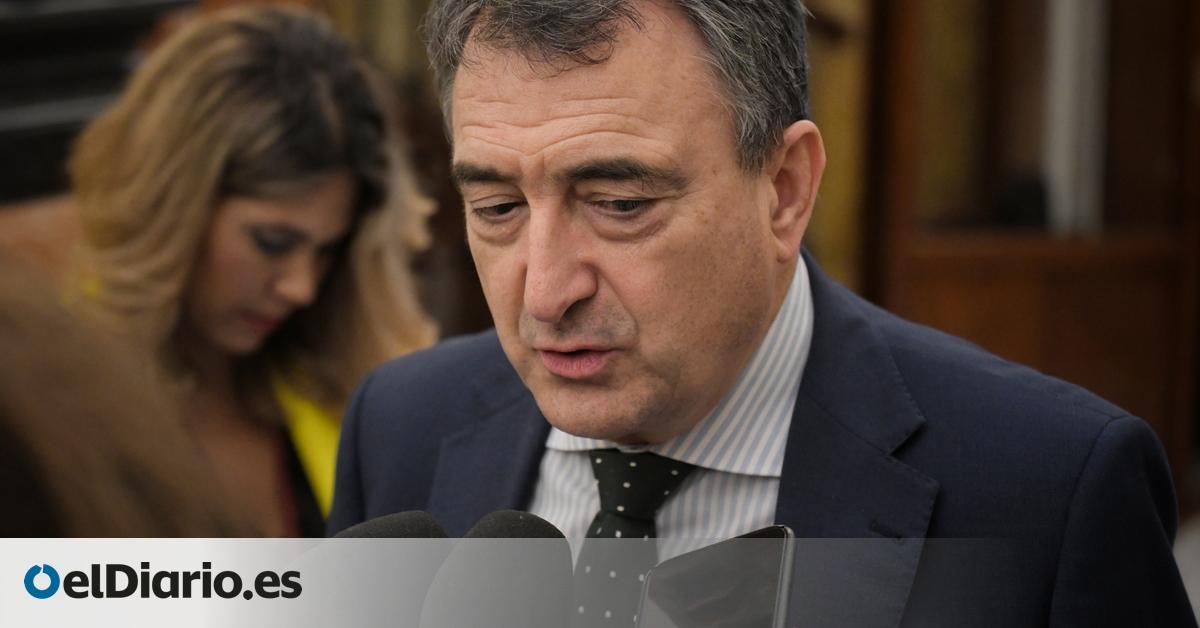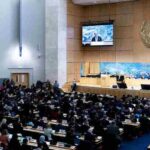
Venezuela is once again a topic of debate in Spanish politics. The PP has managed to secure enough support to promote a non-legislative initiative in Congress that will urge the government to recognise Edmundo González as the elected president of the Latin American country. “It is a strategic imperative, especially after the operation organised by the dictatorship and facilitated by Zapatero and the Spanish government,” said PP MP Cayetana Álvarez de Toledo from the podium to defend her party’s proposal.
The initiative, which was debated this afternoon, was promoted by the PP before the Government granted asylum to the Venezuelan opposition leader, who arrived in Spain on Sunday. The text urges the Executive to recognise González Urrutia as the “legitimate winner of the presidential elections” on 28 July. With the announced support of the PNV, UPN, Vox, PP and also Coalición Canaria, the proposal will go ahead if nothing unforeseen happens with 177 votes when the vote is held on Wednesday in the Lower House.
“This recognition is based on the repeated refusal of the Venezuelan electoral authorities to publish the results in a timely manner, the publication by the opposition of 83.5% of the verifiable records that demonstrate a categorical electoral result, and the official pronouncements of international institutions such as the Carter Center, the United Nations, and the High Representative of the EU for Foreign Affairs and Security,” says the non-legislative proposal.
From the podium, Álvarez de Toledo gave a passionate speech to explain the ten reasons that support his demand. Among them, he argued that the sovereignty of the people “is sacred” and that the “popular will is the only legitimate starting point for a transition.”
Following the Venezuelan elections on July 28, the National Electoral Council announced that, with 80% of the votes counted, Nicolás Maduro had won with 51% to 43% for the Democratic Unitary Platform led by González. However, the opposition almost immediately denounced fraud and published a few days later a compilation of the minutes of the electoral tables that placed González Urrutia as the winner with 67% of the votes.
Since then, neighbouring countries such as Brazil, Colombia, Mexico and Chile have opened avenues for dialogue for a peaceful solution to the conflict between the government and the opposition, including requests to Maduro’s government to publish the official minutes of the electoral count, something it has not done so far. The European Union and Spain have demanded the same, but have not gone as far as the PP is asking, a step that only a few countries have taken, such as Javier Milei’s Argentina, Ecuador and Panama.
“A minimum of coherence is expected from Europe. [El ministro de Exteriores José Manuel] “Albares gathered his colleagues and declared that neither Maduro nor the opposition had won,” the PP deputy complained during the debate, criticising the government’s attempt to find a middle ground. “Recognising González’s victory is as urgent as defending the territorial integrity of Ukraine,” she went so far as to say.
“Spain has a historical and moral responsibility. We were the mother country and today we are a sister nation and a link with Europe. We want the same for Venezuelans as for ourselves: democracy and freedom,” he insisted.
The initiative is part of the PP’s strategy to use the current situation in Venezuela to attack the government. The party has been asking for weeks that the Executive recognise the opposition as the winner of the elections on 28 July. This Sunday, after it became known that Spain had granted asylum to González Urrutia, the PP’s deputy secretary for Institutional Affairs, Esteban González Pons, criticised the humanitarian measure. “It is not doing democracy a favour, but rather removing a problem from the dictatorship,” he said.
While the debate was taking place in the chamber, hundreds of people gathered outside Congress in solidarity with Venezuela, called on Monday afternoon by opposition leader María Corina Machado, amid chants of “Venezuela, freedom” and “You can see it, you can feel it, Edmundo, president.” Edmundo González’s daughter, Carolina, and the former mayor of Caracas and former Venezuelan deputy, also seeking asylum in Spain, Antonio Ledezma, followed the debate from the guest gallery of the Upper House.
After the point was discussed in Congress, several PP deputies accompanied opposition leader Leopoldo López and Carolina González to the Plaza de las Cortes, where she read a statement from her father. “Our fight will continue until we achieve our goals. Do not be discouraged, I will not let you down,” she promised. Carmen Quintela.
The PNV gives its support to the proposal
The support of the PNV is key to the success of the vote on this initiative tomorrow. The PP will achieve this parliamentary victory after convincing the Basque nationalists and the Canary Islands Coalition, in addition to the support that was taken for granted from Vox and UPN.
The spokesman, Aitor Esteban, had announced in the morning that he would support the motion because in the face of the situation in Venezuela “there are no nuances”. The deputy has acknowledged that this issue is usually used “as a battering ram” in Congress, to “throw darts at each other” and to “fight” between the two major parties and has also admitted that it is usually the opposition party that leads this strategy. However, he has announced that his party will give the votes for the text to be approved because “no one has any doubts in view of the minutes that have been published of the opposition’s victory”. “Maduro has done nothing to prove the contrary”, he added.
The spokesman for the Basque nationalists has indicated that he will support the entire text, “if everything goes as normal.” “There is always someone who can throw a log into the stream,” he said, warning the PP to stick to what was proposed and not make “crude” speeches or “overstep certain lines,” looking more at internal politics, he said, “than at the restoration of democracy in Venezuela.”
The Government criticizes the PP for its initiative
The government, for its part, has criticized the Popular Party for having promoted in Congress an initiative for the recognition of González as the legitimate president of Venezuela. “This proposal has a clear objective: to divide. And it ignores the position of all the countries of the European Union,” said the spokesperson minister, Pilar Alegría.
The minister has insisted that the Government’s position remains to “request all the records, demand transparency.” “What we are doing is betting on democracy moving forward in Venezuela and responding to a request for humanitarian asylum,” she said in reference to the reception of the opposition leader in Spain.
The PSOE has in fact presented an amendment to the PP initiative that, de facto, reverses the original meaning of the text. In the modification proposed by the socialists, the Government is urged to continue working within the European Union to maintain a “common position” and to analyse within that framework whether the recognition of González can contribute to a political solution in Venezuela or not.
They also include in this text a point for Congress to support the granting of asylum to the Venezuelan opposition member “for political and humanitarian reasons” and for “his political rights and freedom of expression to be guaranteed”. Finally, the PSOE adds a point that makes it even more difficult for the PP to end up supporting this new wording: “Recognise all mediation work by President Zapatero to allow the release of political prisoners and to build bridges between the Government and the opposition and urge the Government to facilitate it”.
The PP will not accept the amendment and the text will be voted on in its terms. Socialist MP Cristina Narbona, who defended the PSOE’s position in the tribune, criticised the hypocrisy of the main opposition party in using Venezuela, she said, for its political interests in Spain. The spokesperson recalled that under Pedro Sánchez’s governments, Spain has received 125,000 Venezuelans who have requested asylum, while only 125 did so during Mariano Rajoy’s mandate.
“Mrs. Alvarez de Toledo. It is not good to generate false expectations. You cannot deceive the Venezuelans who accompany us into believing that simple recognition will make Maduro disappear by magic. I wish it were so. We have the experience that we lived with Mr. [Juan] Guaidó, whom we recognized without any use,” he said, to finally ask not to “instrumentalize” the Venezuelans.
Sumar also pointed out the PP’s inconsistencies. “Did the PP condemn the coup d’état in Bolivia with such vehemence? Did it condemn the assault on the Bolsonarist hordes in Brasilia in 2023? I remember the jokes while the Planalto palace was being set on fire,” said the spokesman for the plurinational group, Gerardo Pisarello.
The ERC spokesperson, Gabriel Rufián, has followed a similar path. “2019. The PP says that the PSOE embraces Bolivarian communism. Almeida calls Sánchez a ‘populist leader’. November 2023, Hazte Oír parades a bus that says ‘Sánchez Dictator. Ayuso says that Sanchismo is Chavismo. September 2024 Abascal says that Sánchez is a tyrant who must end up in the dock. Why does the leader of a Chavista dictatorship come to exile himself to another Chavista dictatorship? ” he asked.
Podemos spokesman Javier Sánchez Serna has criticised the PP for urging Congress to defend democracy when it “encouraged coups in Peru and Bolivia”. “They want to carry out a Juan Guaidó 2.0 operation. We are not going to be naive enough to join the campaigns of the international right that seek to set Venezuela on fire again,” he said.
Source: www.eldiario.es

